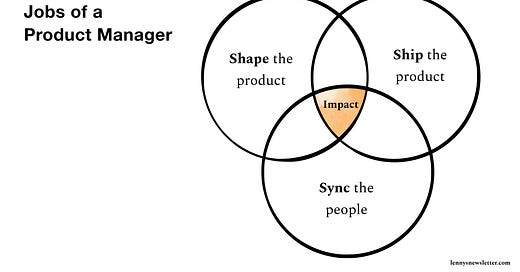👋 Hey, Lenny here! Welcome to a 🔒 subscriber-only edition 🔒 of my weekly newsletter. Each week I tackle reader questions about product, growth, working with humans, and anything else that’s stressing you out about work. Send me your questions and in return I’ll humbly offer actionable real-talk advice.
Q: What exactly is the job of a product manager?
I generally avoid meta questions like this, since they’re rarely actionable or useful. But because this is such a common PM interview question and because I’ve gotten this question from readers enough times and never found a definition that I like elsewhere, I’m going to tackle it this week.
The job of a product manager
I like this baseline definition:
Your job as a PM is to deliver business impact by marshaling the resources of your team to identify and solve the most impactful customer problems.
There are three parts to this, each essential:
1. Deliver business impact
Fundamentally, you are responsible for delivering business impact. If your team drives positive impact—hitting important goals, reducing costs, shipping an important project, etc.—you’re doing your job.
2. Marshaling the resources of your team
Your job isn’t to do the building yourself but instead to increase the leverage of your cross-functional teammates—designers, engineers, data scientists, researchers—to deliver impact. To paraphrase Andy Grove, a product manager’s output = the output of their team.
3. Identify and solve the most impactful customer problems
Business impact comes from solving customer problems. Thus, it’s your job to lead your team to correctly identify, prioritize, and solve the most impactful customer problems.
PMs are the ultimate business lever.
Give me a lever long enough and a fulcrum on which to place it, and I shall move the world.
—Archimedes
The three core jobs of a product manager
Another way to define the role of a PM is to break out the day-to-day jobs of a product manager:
Shape the product: Harness insights from customers, stakeholders, and data to prioritize and build a product that will have the most impact on the business.
Ship the product: Ship high-quality product on time and free of surprises.
Synchronize the people: Align all stakeholders around one vision, strategy, goal, roadmap, and timeline to avoid wasted time and effort.
All of that is a means to delivering impact.
The attributes of successful product managers
A different approach to understanding the PM job is to look at how PMs are evaluated. Earlier this year, I collected and analyzed dozens of career ladders from companies big and small, and out of this emerged 10 common attributes of successful product managers:






